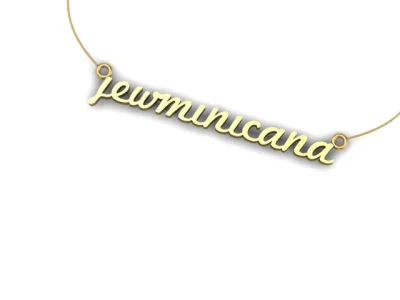 Inspired by a line from Juno where the main character, a pregnant teen, refers to herself as a “cautionary whale.”
Inspired by a line from Juno where the main character, a pregnant teen, refers to herself as a “cautionary whale.”Motherhood is hard. And I don’t just mean raising the babies. I mean having them. I mean trying to have them. And yes, raising them is hard, too.
After finishing up a recent Shabbat meal, I was enthralled by a pregnant friend who started to vent about her frustrations with being pregnant and motherhood. After we’d all done the requisite “oohhing” and “ahhing” and thanking G-d for everything, we began to discuss the anxieties that come with impending motherhood.
My friend talked about feeling nauseous all the time and losing weight from being unable to keep anything down. She also ranted about fears she was having for the pregnancy as well as fears for after the baby’s born. The other women, who rounded out the conversation, included a recent mother and a woman who had recently endured a miscarriage.
I mostly listened. But it was refreshing to hear the women talk about their anxiety openly, knowing that I have my own mixed feelings about growing a big belly, becoming someone’s mom and being able to afford it…not just financially, but mentally and emotionally. But no one ever seemed to talk to want to discuss these issues. Perhaps, they worry that talking about any negative aspects will “jinx” their current or future pregnancies. Or maybe it’s that as women, we know that we’re expected to cope with motherhood and we try to do it as gracefully as possible.
But there’s just so much pressure in the Jewish community to have babies. The first year we were married, people (men and women) would ask whether or not I was trying to get pregnant or whether or not I was pregnant. And if the answer was “no” and “no,” then people hummed around me with sympathy and well wishes for a baby. It got to the point where I said flat out that I wasn’t interested in having babies before my thirtieth birthday. Some people responded with looks of dismay or words of condescension: “But, of course, you want to have a baby!” After all, why didn’t I want to be part of the box they wanted me to fit in, that they thought I should fit in? Now that I’d finally checked off the married box, why didn’t I want to work on putting a checkmark next to “married with children”?
When I asked other Jewish women if they felt pressured, their eyes would grow wide before it would all pour out. They would tell me that they were under constant interrogation from the community, having heard “Are you pregnant?” often from relative strangers and close relatives. They talked about money trouble keeping them from taking the next step. They wanted to finish their Master’s degrees (sometimes, Bachelor’s degrees) or establish their careers. They wanted to work on their marriages. They just couldn’t imagine juggling anything else. But everywhere, someone was lurking, ready to pressure them to “have it all.”
But our husbands lived in a bubble in the meantime. “Honey, did anyone ask you if we were pregnant?” the wives would ask after a Shabbos meal or Jewish family function. Their husbands would wrinkle their noses in disgust. “Who would ask that?” “Well, everyone,” the wives would respond with a sigh after realizing they’d lost count (on both hands) of the amount of times someone had asked them such intrusive questions.
No one (except for his father) asked my husband if we were trying to get pregnant. And he was sure that I had exaggerating the amount of times someone had inquired about the state of my reproductive system. Without his sympathy, I began to seethe.
It struck me as…well, impolite, that people would ask about such a personal subject. I was coming from a Latino culture where there wasn’t too much that was considered “TMI” (too much information) and it seemed like there was an endless list of things that weren’t appropriate for Jewish discussions. I didn’t understand why pregnancy wasn’t an off limits topic, too.
Finally, I wrote about it, posting an update to my blog on my website, entitled “Don’t ask me about my uterus…please.” The final straw had been someone suggesting that because I was out on disability and unemployed that I should be working on getting pregnant. Because what with not being able to take care of myself, beginning eighteen or so years of taking care of someone else would be a breeze, I wondered angrily. I wrote in exclamations: “Did you hear that, people? It’s my uterus and it’s VIP. You’re not invited!”
A married woman whispered in my ear conspiratorially that people would stop asking about my womb once my husband and I made it to our first anniversary.
“Why?” I asked with confusion. “Why would they stop asking after the first year?”
“Because they’ll think you’re having problems.”
“Problems?”
“Getting pregnant.”
And she was right.
After we reached the first year mark, the questions stopped abruptly. But only to be replaced by questioning glances. If I gained a little weight or wore an unflattering dress, people would stare down at my stomach and cock their heads to the side inquisitively.
I would respond with an exasperated shake of the head: “No, I’m not pregnant.”
And now and then, a sad look would overtake my interrogators and they would talk sympathetically about how hard it was to “get pregnant.”
It seemed that suddenly, without any help from me, people had started to believe we might be having trouble. And though I wasn’t, I suddenly realized that I was surrounded by a world of women that were.
One out of four women miscarries, I learned, after a whisper told me that a woman in the community delivered a stillborn baby. Suddenly, there were whispers everywhere about miscarriages that closer friends had had. Women began talking behind closed doors about “trying for months” and falling into deep depressions after miscarriages. I had never imagined that so many women around me might be suffering silently around me.
And when I imagined what it might be like to be asked in the midst of their suffering if they were pregnant, I was horrified for them.
The suffering was everywhere. A NY Times article on women who had battled infertility and lost only compounded my horror further. People were still asking them questions. Only this time, people were asking these women when they were going to adopt. I found myself wincing as I paged through an article in a women’s magazine written by a man who detailed the painful process and expense of fertility treatments.
I think that people ask because they think it’s a safe subject. Somewhere along the line, asking someone who’s married about pregnancy became no more socially incongruous than asking what one does for a living (another subject which may become taboo given the current economy). But it’s not a safe subject when we think about all the couples everywhere who are struggling silently with the subject. Then we realize that questions born out of natural curiosity can be hurtful, even traumatic. And so, I offer that it’s time we make asking about pregnancy and talking about having children off limits in polite conversation. We shouldn’t make people share any more about the subject than they would feel comfortable doing so. We should tiptoe around it like we would any other loaded topic.
I guess, I’m saying that perhaps, it’s time to start asking about the weather again.

Aliza:It was fascinating to find you. My wife and I adopted a baby boy from Guatemala in ’01 and we are raising him as an observant Jew. He is starting to articulate his dual identity of being a Religious Hispanic American Jew. He is accepted well at his day school and part of the new Jewish mosaic.
LikeLike
It has been amazingly helpful on my journey to discover so many multicultural families in the Jewish community. It makes me feel truly at home. In my community, there happen to be other Jewish Dominican families, which is amazing. At shul, I throw out a couple of “Good Shabbos” here and there and when I arrive at my fellow Spanish speakers, I drop a happy “Hola!” into the mix.
LikeLike